Could there be negative mental health implications of at home abortions?
The potential permanence of at home abortion has many positives, but there is a grey area of concerns that should not be ignored

“Why are you smiling so much?”
My friend asked me when I told her the news.
Shock and stress have a funny way of manifesting themselves. It turned out that awkwardly smiling into my phone was my way of processing this news I felt completely unequipped to deal with.
I had just got back from a socially distanced walk with a friend and had felt contented by their company and the slow hum of Cardiff on a cloudless November afternoon.
There was a queue curving around the pavements for Joe’s Ice Cream despite the slight bitterness in the air, and people meandered calmly in and out of the delis and book shops of Wellfield Road. I curved through the crowds, put on my mask, and stepped into the pharmacy.
There was an element of blissful denial as I walked home, to my ground floor flat down a slightly dodgy back alley.
As I unlocked the door, I felt more towards the ASOS parcel in my hallway than the pregnancy test in my pocket. I peed on the little pink stick, tried on my new clothes and completely forgot about the test balancing on the side of my bathroom sink.
The decision

Fast forward an hour, and I was sat in a rather unflattering smock dress - that I was absolutely returning - with the test in my lap and two unquestionable pink lines staring back at me.
It’s not a feeling that can easily be put into words, but all the whirring stresses and daily thoughts floating around my head shut up for a hot minute.
"I knew having an abortion was the right choice for me"
I was at the beginning of an intense masters course, with the clearest road map of where I could see my career heading that I’d had, well, ever. It was a no brainer that having a child was not at my next stop, not to mention that buying the pregnancy test alone almost broke the bank. I knew having an abortion was the right choice for me.
Going through the abortion process during a pandemic had its added stresses; can I go into the hospital? Do they even have the capacity to treat me? It turned out, neither really mattered, due to the temporary legalisation of at home abortions.
This option allows women to take the two abortion drugs, mifepristone, and misoprostol at home if they are no more than 10 weeks pregnant. It didn’t seem like a walk in the park - no option did - but this meant I could have my boyfriend, Joe, with me, and I could be in the comfort and safety of my own home.
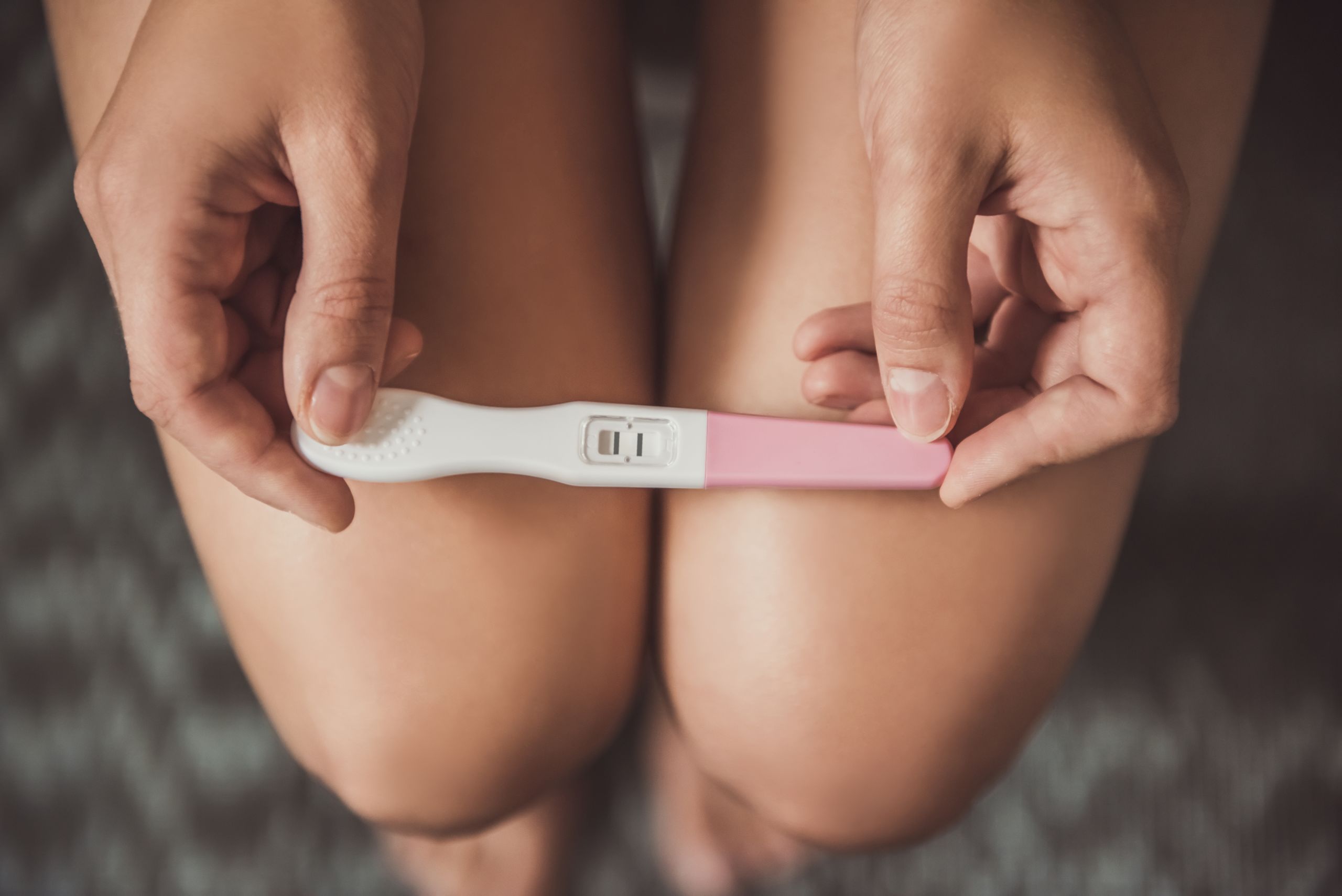
In February 2021, the British government opened a consultation to the public about permanently enforcing at home abortions as an option for women in the early stages of pregnancy.
This meant women could have an online or phone consultation with a medical professional, (often referred to as telemedicine) from organisations such as the British Pregnancy Advisory Service (BPAS), MSI reproductive choices, or through the NHS, and could have both abortion drugs delivered to their homes. No hospital appointments, no long waiting period, no GP.
There are so many positives to the permanence of at home abortions, and I believe it’s a huge step for the UK in terms of increasing accessibility to abortions for women; especially those for whom discretion in their choice may be essential.
However, there is a part of me that feels unsettled by the idea of potentially ‘normalising’ abortion by this quick and easy approach to a very difficult experience, and how the lack of interpersonal care may affect the mental health of women opting for at home abortions in the future.

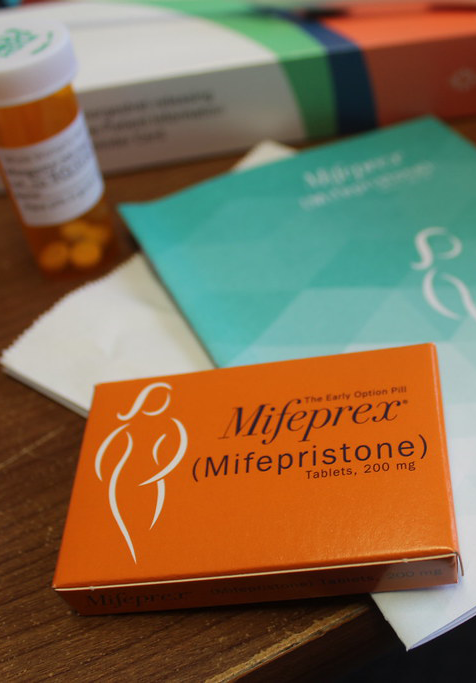
Medical abortions have been the preferable choice since the use of mifepristone was first licensed in the UK in 1991. Up until April 2020, the first abortion pill, mifepristone had to be taken in a licensed clinic. According to the NHS, mifepristone is taken first and blocks the main pregnancy hormone.
The second pill, misoprostol, can be taken at home, and causes uterine contractions and thins the cervix, leading to bleeding and the passing of the pregnancy. If a woman is more than 10 weeks pregnant, she would take this in the clinic.
The later a woman is in her pregnancy, the more painful medical abortions can be, and can carry a greater risk of complication. Therefore, surgical abortion is an option, which consists of two different methods: vacuum or suction aspiration, or dilation and evacuation.
The UK government published a report in December 2020 that showed 82% of abortions performed from January to June 2020 were medical abortions, which rose to 88% in April, showing a noticeable increase since the start of the pandemic. The report states this increase is likely to be a result of the temporary approval of women’s homes as classes of place for early medical abortion up to 10 weeks. The statistics show that 95% of medical abortions performed from January to June 2020 were within the first 10 weeks of pregnancy.
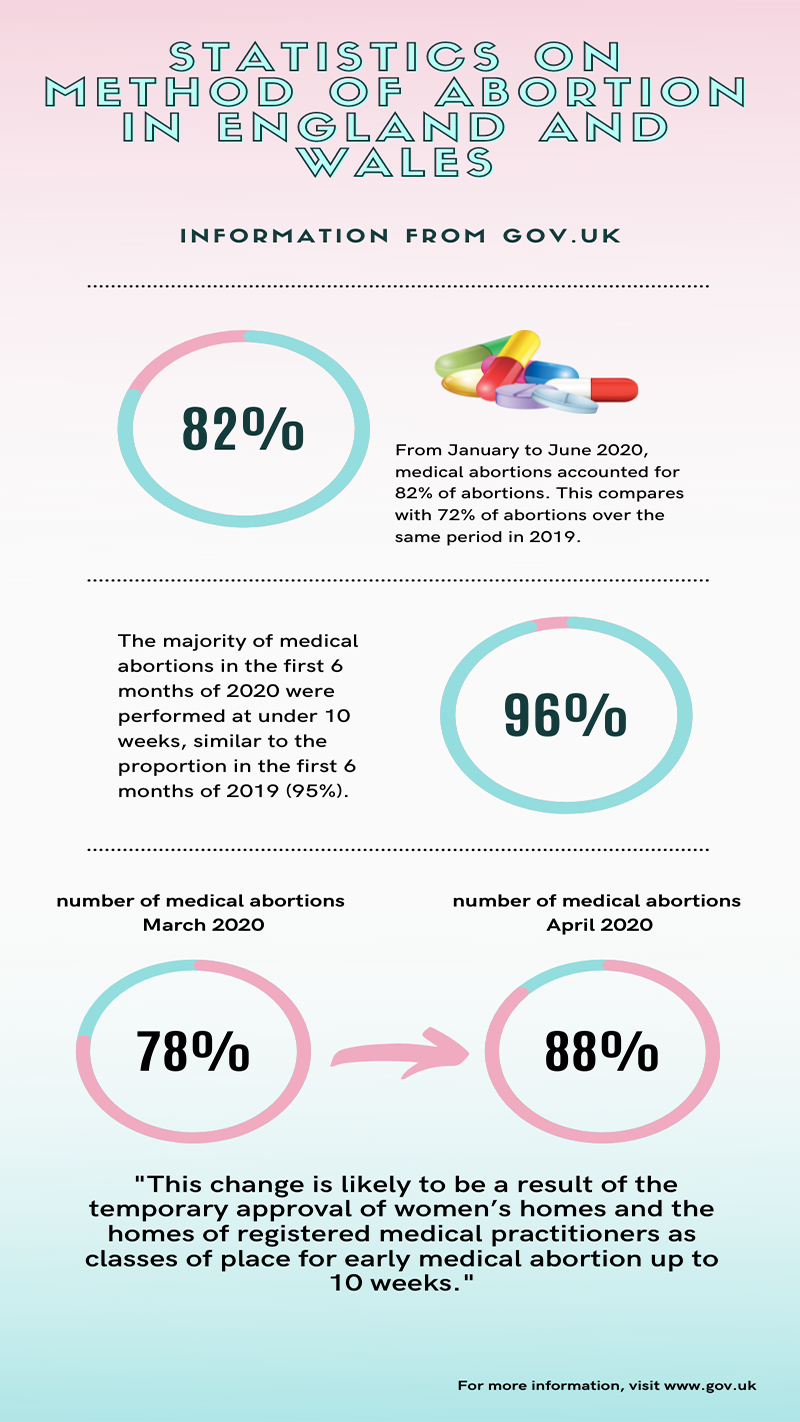
After ringing my local sexual health clinic the day after I took the pregnancy test, it didn’t take long before I had spoken to a few different people who trickled me through the system, and gave me an initial phone consultation with a nurse. MSI reproductive choices state that for at home abortions, patients have to meet a safety criteria to allow for a medical abortion without a scan, therefore being eligible for the drugs to be posted with no in-clinic care.
I was on the pill when I conceived, and the second line that indicates a positive pregnancy on the test I took was faint. This caused a slight concern for the nurse who triaged me and asked me to go into the clinic for a scan the following week.
“Are you feeling okay?” said the nurse, as she handed me a small paper bag with the abortion medication in and some information leaflets. I wasn’t okay. I was scared, and I felt guilty that most of my fear was because this abortion was going to set me back on my masters.
"It was the validation that I needed to hear, that it was okay to feel so sad about something I knew was the right decision for me"
The nurse told me that I should contact the university and take some time off, and it was the validation that I needed to hear, that it was okay to feel so sad about something I knew was the right decision for me; that it was okay to ask for support.


A step in the right direction

It’s unsurprising that comfort and convenience are the two main factors that make at home abortions so appealing, not just for the patient, but the healthcare service too.
"We hope the UK's Department of Health and Social Care will recognise the positive step telemedical abortion care is for the progress of women’s health."
— MSI Reproductive Choices (@MSIchoices) May 14, 2021
- MSI and a coalition of charities and organisations in a letter to the Health Secretary:https://t.co/a9O3hSQ4ZT
BPAS Cardiff’s clinic manager Vivienne Rose said, "They [women] can have consultations at a time that suits them so people are accessing the service earlier - they don't have to go via their GP. They don't have to make arrangements, so it's much easier for them," as per the BBC.
It would be illogical, given the proven benefits of telemedicine, for @MattHancock and @Helen_Whately to revoke at-home abortion care.
— BPAS (@BPAS1968) May 17, 2021
Agree with @Humanists_UK? Email your MP and protect this vital service: https://t.co/B7roohIdbn #PillsByPost @andrewcopson @HumanistStudent pic.twitter.com/DgZyqBWRKX
BPAS have also said that this has reduced waiting times, meaning that women are having abortions earlier in their pregnancy which is safer, and side effects are much less common.
We have signed an open letter to @MattHancock and @Helen_Whately asking them to stand with those that need essential care and permanently legalise at-home early medical abortion care.https://t.co/7zqUL5D9wM#PillsByPost pic.twitter.com/sYSX387vGY
— The FSRH (@FSRH_UK) May 17, 2021
"Women can have consultations at a time that suits them so people are accessing the service earlier"
Sorcha would have had an at home abortion if she had the chance

Sorcha was 19 when she had a medical abortion at 9 weeks pregnant in 2019 and says she would have had the at home abortion if she had the chance.
“The clinic, for me as I suffer with anxiety, was not great as I was permanently on edge and had a panic attack while I was there,” she says, “I think being able to take the pills in the comfort of my own home could have been a better option for me.”
Passing a pregnancy is not only painful, but it can be incredibly traumatic. For some women, not seeing scans and separation for clinics and hospitals can help them deal with what is already a difficult experience.
“I think being able to take the pills in the comfort of my own home could have been a better option for me”
Sorcha says, “Going to the clinic and having the scans and talking to the nurses about it made it feel a lot more real for me, and the guilt I felt after lasted quite a long time.”
Although she doesn’t feel that removing her trips to the clinic would have made a huge difference to the emotional side effects of having her abortion, Sorcha believes that for some women it might ease their nerves to be able to schedule appointments and have people to talk to.
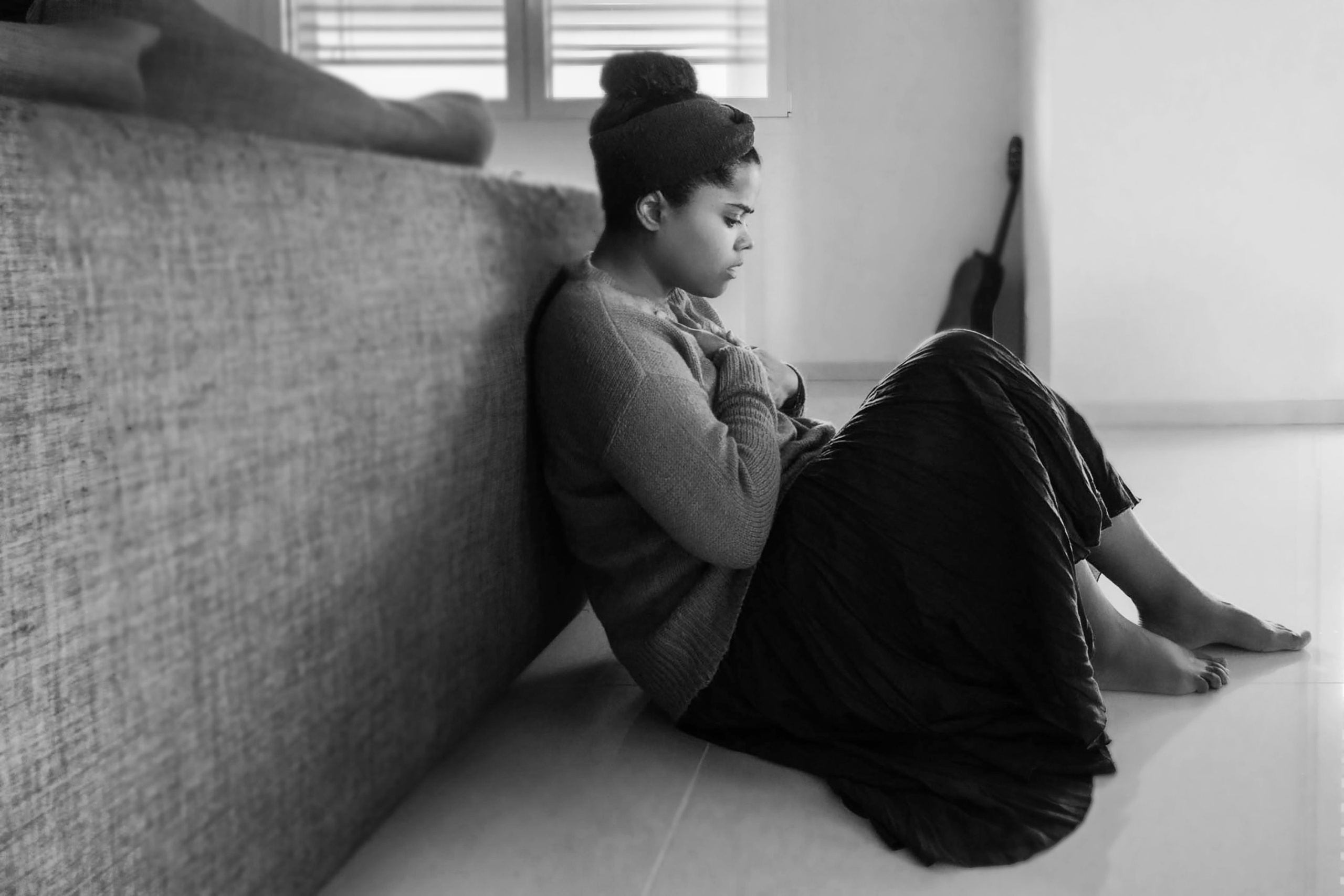
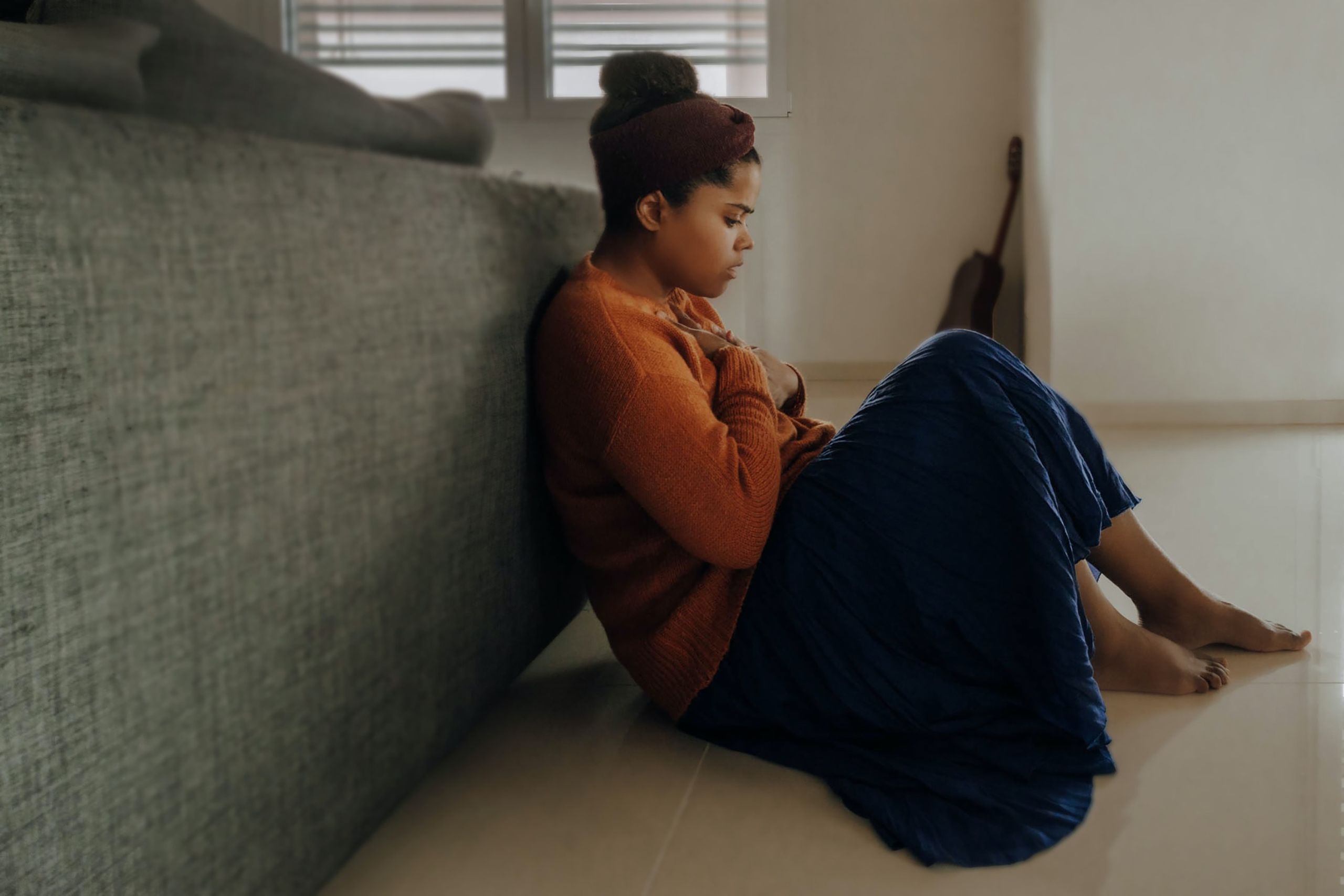
Hidden consequences
Some feel that removing in person medical care may have a detrimental effect on how women cope with an experience as difficult as abortion.
“Taking the abortion pill away from medical supervision totally avoids dealing with the real issues facing women in that situation,” said Irish Obstetrician Dr Peter Bolyan, who campaigned for the legalisation of abortion in Ireland.
“It makes no provision for real, affirmative aftercare for these women potentially leading to further emotional and medical risk,” He says.
For me, the one-on-one care I had in the clinic was essential in easing the feelings of loneliness that I experienced when having an abortion.
“Taking the abortion pill away from medical supervision totally avoids dealing with the real issues facing women in that situation”
Despite the support I received from family and friends during the process, the weight was on my shoulders, it was my physical pain, my emotional health that suffered the aftermath. The nurses made me laugh, made sure I had someone at home to look after me, and their experience and empathy with women like me made me feel stronger.
It is a concern that simply posting abortion medicine to women with no real physical care may unintentionally remove the type of support I received that I found so invaluable.
Could the quickness, convenience, and lack of discussion between practitioner and patient actually create more of a taboo surrounding abortion, allowing it to be swept under the carpet? Or, could it normalise abortion to the point where it’s treated like any old procedure from the perspective of the practitioner? Will the women down the other end of the phone silently suffer the emotional and physical consequences alone?
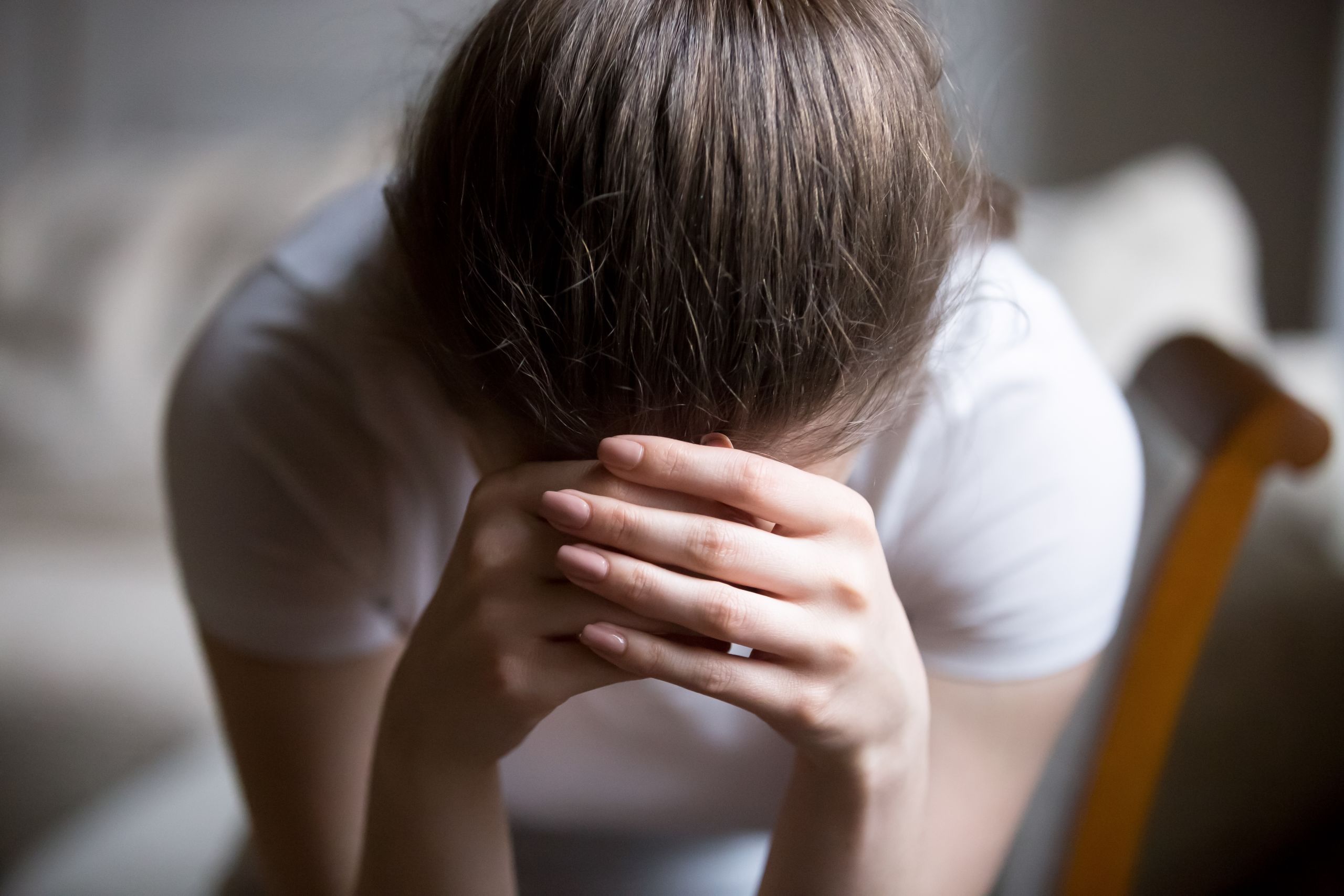
It’s difficult to say, and nobody can really know the answer. Each woman’s experience with abortion is totally unique, and the aftercare and emotional support that will still be offered to women going through at home abortions remains unclear.
Hope

The permanence of at home abortions is still very much a discussion, and it’s genuinely one that I feel should go ahead.
I hope that women will still receive the same level of care from practitioners over the phone as they would if they were sat opposite each other in the clinic. Abortion is something that still holds such a stigma, despite the fact that statistics show that 1 in 3 women have abortions in the UK, with 95% of women claiming that they don’t regret it.
The consultation concerning the permanence of at home abortions has opened the lid on abortion discussion in the UK, and as a society we must continue to talk about it.
"I hope that the physical removal of women in clinics and hospitals doesn’t force our narrative into a dehumanised voice behind the telephone"
If the permanence goes ahead, and the dust starts to settle as it often does, I hope that the physical removal of women in clinics and hospitals doesn’t force our narrative into a dehumanised voice behind the telephone; because it will always be more than that.
